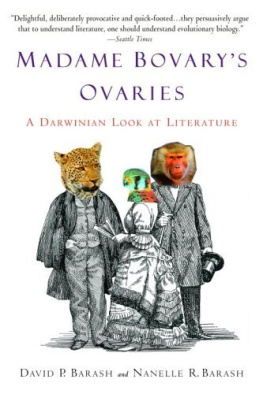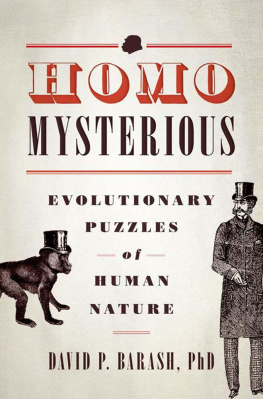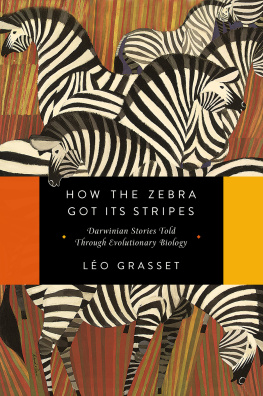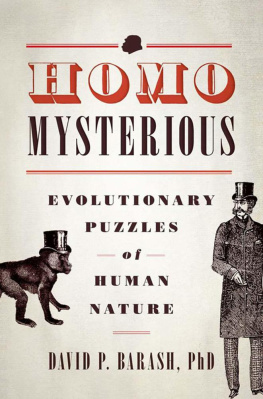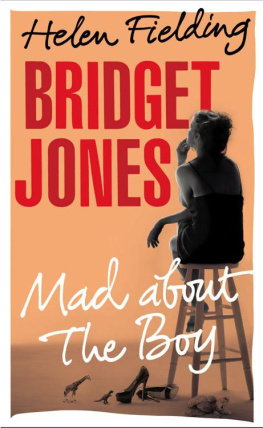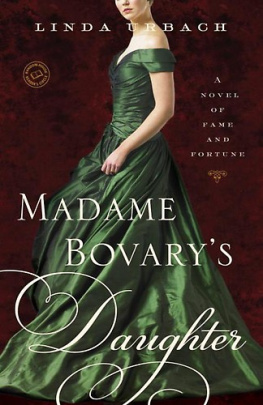Table of Contents
Praise for MADAME BOVARYS OVARIES
A whimsical and unique analysis of the forces motivating literary characters.... This well-researched and humorous narrative will appeal to lovers of evolutionary science as well as of literature. Science News
With a very readable prose style, David and Nanelle Barash give account of an important new development in literary criticism: the incorporation of the biology of human nature.
Edward O. Wilson, Pulitzer Prizewinning author of On Human Nature
Lies at the crossroads between literary studies and biology, and has much to offer students of either subject. Nature
Delightful, deliberately provocative and quick-footed... they persuasively argue that to understand literature, one should understand evolutionary biology.... An English teacher or book club hoping to provoke a spirited discussion should take a look. Seattle Times
An engrossing, provocative work of literary speculation.
San Francisco Chronicle
An intriguing and groundbreaking book. Barash and Barash take us on a romp through the classics to explain why these characters and plots ring so true.... You will never look at Othello, Jay Gatsby, Hester Prynne or Leopold Bloom the same way again.
Helen Fisher, author of Why We Love
Witty and insightful... their explicit goal is to apply the basic principles of sociobiology (think Richard Dawkins The Selfish Gene ) to the study of literature... the result is a surprisingly lighthearted romp through both literature and the animal kingdom, aimed at a casual reader whos interested in either or both. Publishers Weekly
To the memory of
Nat Barash
19152005
Madame Bovary, cest moi.
GUSTAVE FLAUBERT
THE HUMAN NATURE OF STORIES A Quick Hit of Bio-Lit-Crit
Othello isnt just a story about a jealous guy. Huckleberry Finn isnt just a rebellious, headstrong kid. Madame Bovary isnt just a horny married woman. As students, we are told about various ways to understand fiction: that Othello may also teach us about deceit and loyalty (among other things), how Huck will tell us about the American national character, that Madame Bovary will help reveal the meaning of social transgression. In addition, those who get deep and sophisticated enough may be urged to examine what they read from various perspectives: those of Marx, Freud, Jung, or maybe the French literary theorists Derrida or Foucault, not to omit feminist and queer studies, socioeconomic analyses, and the historical facts of each authors personal biography. The list is nearly endless: New Criticism, old criticism, new historicism, old historicism, critical theory, and sometimes crackpot theory.
Its all fine, up to a point. No one has a monopoly on how to read what others have written. There is much to be said for examining literature as a reflection of class struggle (Marx), unconscious drives (Freud), power relations (Foucault), social mores, sexual repression, historical forces, or evenas postmodernists often insistof texts that signify nothing more than themselves. But in fact, Othello is a story about a jealous guy. Huck Finn is a rebellious, headstrong boy. And Madame Bovary is a horny married woman.
The reason Othello is still being read and performed five hundred years after Shakespeare wrote it is because this play tells us something timeless and universal... not so much about a fellow named Othello but about ourselves. It speaks to the Othello within everyone: our shared human nature. Othello the play is about a jealous guy, and, as we shall see, jealousy is a particularly potent and widespread human emotion, one to which men are especially vulnerable. Thats precisely why its okay to talk about Othello or Madame Bovary or Huckleberry Finn in the present tense: they live on, at least in part, because they have distinctly human characteristics that transcend the artistry by which they were depicted. Their tribulations, responses, loves and hates, fears and delights are in some way recognizable to all readers, to marvel at, agree or disagree with, learn from, or be shocked by.
It may be startling to someespecially those who have not kept up with recent advances in biological sciencebut the evidence is now undeniable that much of human life is not socially constructed. In short, even though learning and cultural traditions exert a powerful influence, there also exists an underlying human nature, universally valid and characteristic of all Homo sapiens . People live in many different places, following many different traditions and cultural trajectories, but beneath this wonderful diversity there is something else that is equally wonderful, and maybe even more so: a common thread of recognizable humanity, woven of human DNA and shared by everyone who reads and writes (as well as those who dont). Othellos jealousy, Hucks rebelliousness, and Emmas urges are just three examples of that common thread.
In his advice to the traveling players, Hamlet suggested that the role of the artist is to hold a mirror up to naturenot, as some theorists would have it, to hold a mirror up to another mirror and thereby reflect only the infinite emptiness of mirrors. The nature at issue here isnt wild animals, pretty landscapes, or magnificent wilderness, but human nature. And human nature isnt like a unicorn or some other mythical beast. It exists. It does so because human genes exist and have produced a different kind of creature than horse genes or hyacinth genes have. Read deeply, writes Harold Bloom in How to Read and Why ,... not to believe, not to accept, not to contradict, but to learn to share in that one nature that writes and reads.
As Bloom intuits, connecting literature and human nature isnt really all that new. Until recently, in fact, our most enduring images of human nature have resided in literature. Where better to find it? Psychology, for instance, didnt even exist until scarcely a hundred years ago, and during most of the twentieth century, it was torn between two equally unhelpful poles: the semimystical mythologizing of Freud and the sterile behaviorism of John Watson and B. F. Skinner. Anyone wanting to get a sense of human nature in, say, the Bronze Age can do no better than to excavate among the words of Homer, or for the Elizabethan Age, Shakespeare.
Universal human nature was perceived thousands of years ago by our greatest storytellers, from the early authors of the Hindu Mahabharata , the Babylonian tale of Gilgamesh, and Homers Iliad and Odyssey to Virgils Aeneid and the writings of Dante, Cervantes, and Shakespeare. It wasnt until Charles Darwin, however, that the scientific basis for human nature was identified. Actually, some of the most important breakthroughs didnt occur until a century and more after Darwin, when the genetic basis of evolution by natural selection was discovered and its implications for human behavior were made clear.
These breakthroughs havent had much direct effect on the conscious creation of literature, but we hope to show that they can be immensely useful in its interpretation , since they help the reader to see what was always there, albeit generally unacknowledged by writers and readers alike. Roland Barthess celebrated essay The Death of the Author proclaimed that the intentions of an author do not matter in interpreting his or her text. We agree, to a point. It doesnt matter, for example, whether authors are intentionally presenting a biologically accurate view of human beings. In fact, it is even more telling if they have no such aim and yet end up doing just that; nature whispers within their work nonetheless. Just as it did among the ancients, biology continues to flourish inside the best of our modern writers.

